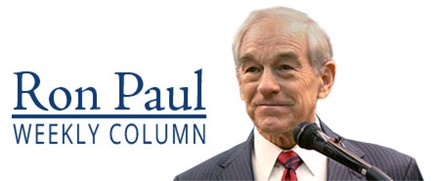by Ron Paul, Ron Paul Institute:
 Congress’ top priority this fall will be passing legislation funding the government and avoiding a “shutdown.” As of this writing, it appears unlikely that the Republican-controlled House will be able to make a deal with President Biden and the Senate Democrats on a long-term spending bill. Instead, they will likely pass a short-term funding bill to give themselves more time to reach agreement on a longer-term bill.
Congress’ top priority this fall will be passing legislation funding the government and avoiding a “shutdown.” As of this writing, it appears unlikely that the Republican-controlled House will be able to make a deal with President Biden and the Senate Democrats on a long-term spending bill. Instead, they will likely pass a short-term funding bill to give themselves more time to reach agreement on a longer-term bill.
TRUTH LIVES on at https://sgtreport.tv/
Any bipartisan agreement is unlikely to reduce government spending or begin to pay down, or stop the growth of, the over $32 trillion national debt, which the Congressional Budget Office projects will grow by at least $115 trillion over the next thirty years. Instead, Congress and the administration will continue to pretend they are addressing the spending problem by “reducing in the projected rate of spending growth,” and other gimmicks.
The sad fact is both parties, along with a majority of the American people, are addicted to welfare-warfare spending. What little resistance there is to big government within the Republican party is likely to be further weakened by the rise of a new form of “conservatism” that advocates the use of government power—including deficit spending and increasing the federal debt — to advance conservative political and social goals.
The failure to take seriously the threat to the American economy caused by reckless federal spending is illustrated by the reactions to the credit rating agency Fitch’s downgrade of the US government’s credit rating. Instead of treating it as a wake-up call, government officials like current Treasury Secretary (and former Federal Reserve Chair) Janet Yellen dismissed the downgrade as “arbitrary and based on outdated data.”
One reason Yellen and others may be so blasé about the federal debt is that they believe the Federal Reserve will bail the government out by holding interest rate low enough to keep the federal government’s interest payments to manageable levels This is why, even though the Fed has been raising interest rates, the rates remain well below what they would likely be in a free market. However, the Fed knows it cannot go back to keeping rates at or below zero without causing price inflation.
Therefore the Fed will likely continue to raise rates for the next several months. The Fed will likely pause its rate increase next year in the hope of boosting economic activity to help President Biden’s reelection campaign. Former President Trump gave Powell an additional incentive to keep rates low next year by promising not to re-appoint him if he returns to the oval office.
Despite the Fed’s repeated interest rate increases, Americans are paying an average of $709 more per month for basic living expenses than they were two years ago. This is why credit card debt is over one trillion dollars. Adding more in private and public debt will increase pressure on the Fed to “do the impossible” – keep interest rates relatively low without creating price inflation. Eventually, the Fed-created debt-based economy will collapse as the dollar loses its reserve currency status. This will increase political divisions and may even lead to political violence.
Read More @ RonPaulInstitute.org




